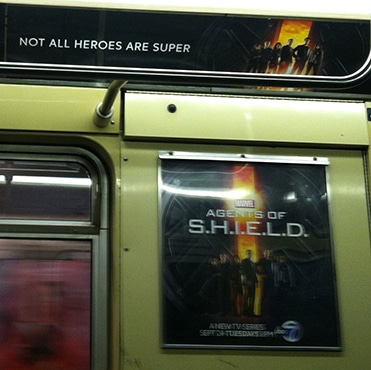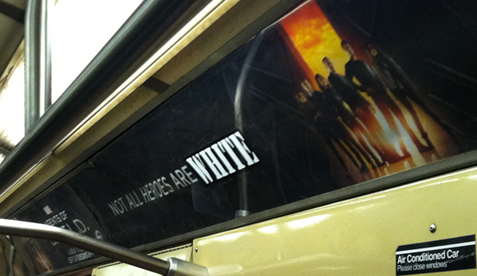By Vivian Obarski
As an Agents of SHIELD viewer, I won’t lie that that show has a lot of issues, perhaps one of the bigger ones is cast diversity. I’m not a fan of the fact that it seems like every time a person of color is on the show, they’re the weekly baddie. I want to see Mike Peterson and Akela Amador come back instead of being shuttled off to Tahiti or whatever SHIELD containment facility they have. I am not a fan of the Great White Savior trope. I want more representation.
I’m with most of the critics of the show when it comes to that. But what I’m not with is this:
Because seriously? SERIOUSLY? Yeah, the cast is pretty white, I won’t deny that, but to say that they’re all white erases Agent Melinda May (played by Ming-Na Wen) and Chloe Bennett (who is half-Chinese — HAPAS REPRESENT!). It falls into a shadism where if the skin color is too light, they’re not considered to be a person of color — in this case, a cast isn’t truly diverse unless there are people of a certain skin tone, without consideration of a person’s background and experiences.
It’s a personal thing, I won’t deny it. It hits hard for me because that sums up a lot of what Asian Americans deal with regarding intersectionality — or as Lindsey Yoo wrote for NPR CodeSwitch:
I am aware that certain segments of the Asian-American community do enjoy more privileges than other people of color. But I am also keenly aware of the ways that I, like other people of color, am yoked and burdened by the existing structures of power and privilege. I am oppressed both as a woman and as a person of Asian descent. My body is constantly orientalized and hypersexualized by people who are more comfortable seeing me on television as a giggling, sexually repressed schoolgirl or whip-carrying dragon lady/tiger mom than they are with seeing me as an empowered individual with a dynamic history and voice.
This dismissive attitude toward Asian-Americans causes a dangerous rift in the ever-evolving journey toward true solidarity and the dismantling of racial and gender hierarchies. It’s difficult, for instance, to feel like an ally when so many prominent feminists around me choose to praise and write aboutOrange Is the New Black for its portrayals of gender and race, but make almost no mention of the lazy, racist depiction of the lone Asian female character. Unlike the other characters in the series, Chang is given no substantial backstory or opportunity to redeem herself. She functions only as a vessel of cheap humor that draws from her awkward, accented English.
This binary attitude is what sets up things like accusations of bias in acceptance to college, or how Asian American history isn’t even taught — maybe there’s a footnote on Chinese workers helping with the transcontinental railroad and a brief nod at the internment of Japanese-Americans during World War II. It leads to the model minority myth which basically, as far as I can tell, is used to limit us and divide us from other POCs. Don’t forget, the model minority myth is basically respectability politics in action. It’s fuckin’ bullshit because no matter what, Asians are not white and our experiences are not that of the majority class.
It’s fair to criticize Agents of SHIELD because it seems to send the message that if a POC gains one iota of power, they lose control or can’t handle it. It’s fair to criticize how white the Marvel Cinematic Universe is, especially in stark contrast to the comic books (which most recently announced that a Muslim teenage girl would be the next Captain Marvel). But to say that Ming Na Wen and Chloe Bennett are basically white is erasure of the contributions that Asian Americans have made and are continuing to make in media.



